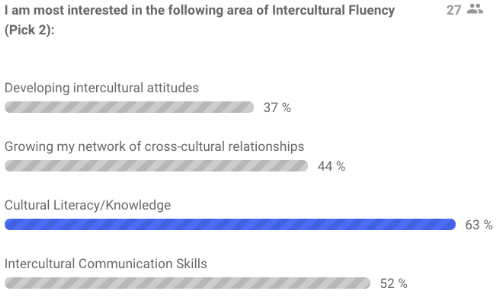FIRST WEST CREDIT UNION
Diversity & Inclusion Training v2.0
FALL 2018
The following program is a revision of the diversity and inclusion pilot training presented in Langley, BC on November 30, 2017. The modules and sequence have been adjusted to reflect the feedback collected from the pilot and the training performance leaders received at the 2018 Leaders Summit in Whistler, BC.
Participants are invited to contribute examples of specific cross-cultural scenarios to be workshopped. If you have a specific question around diversity and inclusion, or an intercultural scenario you would like to share, please feel free to use the form at the bottom of this page, or send me an email at alden@aldenhabacon.com
Fall 2018 Program
Session A:
Inclusive Leadership & Championing Inclusion Excellence
9:00 AM to 10:20 AM (80 minutes)
Purposeful leadership requires a strong sense of intentionality. In this opening session, participants will examine the different kinds of diversity in the workplace, the Diversity Business Case for a more inclusive workplace, and using the Diversity Change Curve (below) also explore the organizational stage-by-stage process towards fostering a work environment where people with profound differences thrive. Participants will determine where they are in the D&I journey and what diversity business case benefits are most relevant to First West.
This is followed by an examination of how leaders to model inclusive attitudes, language and behaviours; and how the failure to demonstrate inclusive leadership drives talent away, harbours discrimination, normalizes inequity and has direct impact on the mental health of workplaces.
This module explores the most recent report by Deloitte on when employees feel included, provides a research-based framework around the key traits for inclusive leadership, and further examines differences in what various employee groups perceive as inclusive leadership behaviours.
Session B:
Intro to Intercultural Leadership and Confronting Cultural Bias
10:30 AM to 12:00 PM (90 minutes)
This engaging and interactive session provides a frank conversation about the complex difficulties of leading more diverse and inclusive organizations and/or teams, the intercultural afterthought, and what is required to convert a team’s diversity into innovation. This module covers:
The impact of cultural differences
The stages of personal change that must occur to formalize an intercultural mindset
Developing Intercultural Fluency
Whose responsibility is it to adapt?
Overcoming the fear of saying the wrong thing
This module will also examine the idea of a colleague sense of “fit” and the related points of cultural conflict in a diverse team. An adaptation of the Bennett Scale (also called the Developmental Model of Intercultural Sensitivity) will be presented. The Intercultural Fluency Model will be introduced and participants will be invited to identify area of future development.
Related Resources:
Preparing the Workplace for successfully hiring and on-boarding internationally trained professionals (DIVERSEcity)
Soft Skills for Success in Canada (Alden E. Habacon)
Session C:
Community of Practice: Action-Planning from the Inclusion Survey
1:00 PM to 1:45 PM (45 minutes; Forum)
In this 45-minute open forum, performance leaders will have an opportunity to share what has come out of the conversations with their teams around the inclusion survey, hear from each other what plans are on the horizon, share any promising approaches or concerns, and glean key learning from any failed efforts at fostering an inclusive workplace.
Session D:
Practical Tools for Suspending Judgement
1:55 PM to 2:55 PM (60 minutes)
Building upon the preceding modules on intercultural leadership, this session delivers an introduction to practical tools for suspending judgement in cross-cultural interactions and provides specific strategies for improving cross-cultural communication. Participants will then have an opportunity to practice using these tools with case scenarios.
+ Participants are invited to contribute examples of specific cross-cultural scenarios to be workshopped using the submission form at the bottom of this page.
Session E:
What? So What? Now What?
3:00 PM to 3:30 PM (30 minutes)
The closing workshop is a space for attendees to digest and self-reflect on what they have learned or discovered through the day, and what impact this might have on their aspirations as well-intentioned leaders in their organization. It will also provide space for honest dialogue and reflection on how leaders can further develop the courage and commitment to lead inclusively, disrupt exclusion and most effectively be an ally to women, people with disabilities, Indigenous Peoples, people of colour, and LGBTQ2S+ employees.
Session F:
Courageous Conversations: Implications of Being a Male Manager
3:45 PM to 4:45 PM (60 minutes; Conversational)
The following module provides a space for male managers to reflect on the previous material, and engage in a “courageous conversation” or what is also known as Candid Candour (see video below) about power dynamics, gender dynamics and what impact the pursuit of diversity and inclusion (and other related leadership training, sexual harassment training and conversations about #MeToo) have had—and will continue to have—on male managers. This module will be specifically devoted to acknowledging the challenges around self-regulating emotions, fostering psychological safety, and delivering “emotional first aid”.
This facilitated conversation will explore:
How to navigate the perception of male feedback to women;
What does it mean to treat everyone with respect, across gender and cultures?
What happens when the personality traits of staff don’t align with corporate culture?
How to have robust conversations, while holding respectfulness; and
The implications of being in a position of power in the workplace.
Questions | Submit an Intercultural Scenario
If you have a pressing intercultural challenge or question, please feel free to use the form below (names and contact information is optional):




